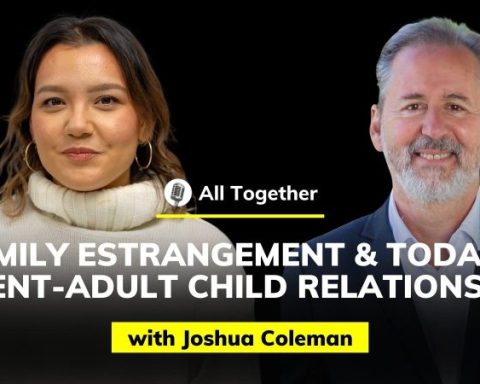Family estrangement is not unusual and more common than what you hear. It is believed to be as widespread as divorce. Surveys found one in four adult Americans are estranged from their families, nine in ten parents in the UK are estranged from an adult daughter or son, and nine out of ten adults in the UK are estranged from at least one parent.
Rather than accidental, family estrangement is intentional. It does not happen because family members are physically distant and lose contact with one another. It takes a long negative relationship until someone intentionally decides to distance themselves from their family. It may seem like an outcome of a perceived destructive relationship.
However, in most cases, family estrangement is a process occurring in a continuum, meaning that it can take different forms. Some are physically estranged, and others are in emotional estrangement. Some are continuously estranged, and others may show on/off patterns.
The stigma around family estrangement
The common societal view on family relationships emphasizes how people are obliged to their families. Family relationships should be involuntary and inherently positive. Consequently, those who do not follow this standard are bound to violate social norms and be stigmatized. A survey found that 68% of estranged people reported a stigma surrounding estrangement. They reported experiencing blame, judgment, dismissal, and avoidance from other people.
The survey revealed that, besides contradicting the expectations of family relationships, estranged people are stigmatized because other people think it is their fault and that there must be something wrong with them that leads to estrangement. They are advised to reconcile or to believe that the estrangement is temporary, which captures a lack of understanding of their experience and emotional challenges due to estrangement. These stigmas reinforce estrangement as a silent issue as people bottle up their struggles with coping with family estrangement.
The meaning of normalizing estrangement
Most people fail to understand that estrangement does not just happen out of rage. Family estrangement stems from a long period of emotional disconnection, repeated hurts, and grievances. A single conflict may simply act as a trigger that leads to an individual’s decision to separate. But in most cases, people mentioned experiencing multiple forms of abuse, neglect, parental alienation after separation or divorce, conflicting personalities, in-laws issues, clashes in value systems and expectations, and mental health problems as the causes of the estrangement.
Those factors show another perspective of family relationships, which are not without flaws and can even be harmful, unlike common belief. Normalizing family estrangement means shifting the view on family relationships from involuntary to voluntary. This enables individuals to see different relational alternatives besides maintaining a toxic relationship and staying in misery.
Normalizing family estrangement becomes important as it allows people to be honest about being estranged from family members and seek the support they need without fear of being stigmatized.
Establishing distance and boundaries with family members who cause feelings of emotional distress is particularly beneficial for an individual’s emotional and/or physical safety. For some individuals, it can be the only way to escape a toxic environment, heal from their wounds, and achieve happiness.
Around 80% of estranged adults reported positive outcomes from estrangements, such as greater feelings of freedom, independence, and gaining new insight and understanding of their family life from an outside perspective. Only after leaving the relationship did they learn that they had been stuck in patterns of negative behavior or a state of learned helplessness.
Ways to normalize estrangement
Several ways may help normalize family estrangement and promote a new perspective of family relationships, despite their involuntary nature. The key is to start with yourself by putting in efforts, no matter how small. If you are estranged from a family member, these are a few ways to help you go through it with new perspectives:
- Take responsibility for your own life and do not feel obliged to fix your family or stay in relationships that risk your well-being.
- Put yourself first, and do not feel guilty for doing it or refusing your family members’ requests. Doing so does not equate to selfishness, especially if other people’s expectations can harm your feelings and make you sacrifice your needs.
- Look for other options from hurtful family relationships, such as setting boundaries with toxic family members or completely cutting off contact with them.
- Share your struggles with family estrangement with people you trust and/or professionals who can offer a safe space to open up about your struggles and provide non-judgemental advice.
- Understand that everyone deserves love and protection, even if it means cutting off contact with family members. Growing up in a dysfunctional family does not make anyone less worthy of love.
If you know someone who is being estranged from their family, consider these ways of supporting them:
- Respect their decision. You will never know how their family relationships are and what they have gone through. So, assume they have good reasons to be estranged from their family.
- Offer a listening ear or suggest getting professional help to cope with the challenges.
- Do not advise them to reconcile.
- Remember them during holidays and consider inviting them over to celebrate together.
In conclusion
Estrangement may not be for everyone with destructive family relationships. But, anyone with such relationships has the full right to quit and separate from their source of distress, including their own family. Family may be the beginning of most individuals’ lives, but for some people, it is not the safest place to grow and thrive.
By normalizing estrangement as an alternative to hurtful family relationships, you do not devalue family ties yet offer another way of seeing it; not as a relationship that is taken for granted and provides no choices for the members, but as one that is intentionally built to offer a safe, positive environment for all members.
If you would like to learn more about dealing with family estrangement, the Life Management Science Labs’ (LMSL) Family Science Labs features resources based on the research of the Institute for Life Management Science. There are courses and certifications also available for those interested in taking a more in-depth approach. Visit the Family Science Labs today.
Photo by Sofia Bocharnikova on Pexels



